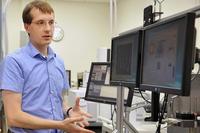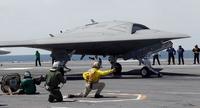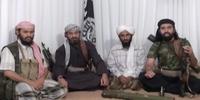-
New technology improves IED detection

Improvised explosive devices, or IEDs, are homemade bombs that can both injure and kill civilians and service members. One solution to the problem of IEDs is to find them before they explode by detecting the chemicals used in the explosives. Scientists at the U.S. Naval Research Laboratory (NRL) have developed a technology, using silicon to fabricate a sensor that may revolutionize the way trace chemical detection is conducted
-
-
U.S., allies prepare military strikes against Syria

Secretary of State John Kerry yesterday said that the use by the Assad regime of chemical weapons in attacks on civilians last Wednesday was undeniable. He said the Obama administration would hold the Syrian government accountable for this “cowardly crime” and “moral obscenity.” U.S. political and military leaders have been holding around-the-clock discussions with allies about a coordinated military attack on Syrian regime facilities. The United States, the United Kingdom, France, and Turkey said there was no need to seek a UN Security Council approval of military action against Syria, and that none will be sought. Administration lawyers have been crafting legal justifications for an intervention without UN approval that could be based on findings that Assad used chemical weapons and created a major humanitarian crisis. The U.S. Navy has moved more ships to the eastern Mediterranean, and activity has been stepped up in Britain’s air base in Cyprus.
-
-
Israel offers proof of Assad regime’s responsibility for chemical weapons attack
Israeli sources said that the IDF’s sigint unit, Unit 8200 – which, among other intelligence operations, routinely eavesdrops on communications among military and political leaders in Syria — has recordings of senior Syrian political and military officials discussing the timing and scope of the chemical attack last Wednesday against civilians in rebel-held areas. Israeli intelligence sources have also identified the Syrian military unit which fired the chemical weapons: the 155th Brigade of the 4th Armored Division of the Syrian Army, a division under the command of the Syrian president’s brother, Maher Assad.
-
-
U.K. newspapers complain government "conflating terrorism and journalism"
The U.K. government, relying on the Terrorism Act 2000, has recently taken actions against several newspapers, culminating the 18 August detention at Heathrow Airport of David Miranda. Miranda is the companion of Glenn Greenwald, the Guardian’s journalist who broke the Snowden story, and the security services believed Miranda, a Brazilian, was transporting Snowden-related material with him. He was detained and questioned for nine hours.
-
-
U.K. newspapers complain government "conflating terrorism and journalism"
The U.K. government, relying on the Terrorism Act 2000, has recently taken actions against several newspapers, culminating the 18 August detention at Heathrow Airport of David Miranda. Miranda is the companion of Glenn Greenwald, the Guardian’s journalist who broke the Snowden story, and the security services believed Miranda, a Brazilian, was transporting Snowden-related material with him. He was detained and questioned for nine hours.
-
-
Boob bombs: breast implants suicide bomb a threat to aviation
Security checks at Heathrow Airport have been beefed up this past week following “credible” intelligence that al Qaeda operatives may use a new method to attack airlines flying out of London: explosives concealed in breast implants. This would not the first time Al Qaeda in the Arabian Peninsula’s (AQAP) chief bomb maker, Ibrahim al-Asiri, has sought to use the human body as a hiding place for explosives. In September 2009, al-Asiri sent his younger brother on a suicide mission in Saudi Arabia. He built a bomb which could fit in his brother’s anal cavity, and sent him to kill the Saudi deputy interior minister, who at the time was in charge of hunting down al Qaeda operatives in Saudi Arabia. The worry about medically implanted explosives has already led airports to use behavioral analysis to augment detection methods already in use to screen people. Body scanners are good at identifying things outside the body but not inside.
-
-
As many as 1,400 killed in a suspected chemical attack in Syria (updated)
Rebel sources say the number of dead in a Syrian army chemical weapons attack, which targeted a dozen villages in a rebel-held area east of Damascus, has reached 1,400. The Syrian government admitted launching a major military offensive against rebels in the area – both rebels and government sources say it is the largest military operation since the beginning of the war — but strongly rejected the allegations about chemical weapons use by the Syrian army. The Israeli defense minister, in the first official Israeli reaction, confirms the Syrian military used chemical weapons. Chemical weapons experts say there are two other possibilities: the Syrian regime may have used crowd-dispersal chemicals in higher-than-usual concentration, causing death among people trapped in bunkers and shelters; or the army may have used fuel-air bombs in bombing Sunny residential areas. Such bombs, also called thermobaric explosives, rely on oxygen from the surrounding air, unlike most conventional explosives which consist of a fuel-oxidizer premix.
-
-
New understanding of key step in anthrax infection
Scientists advance A new hypothesis concerning a crucial step in the anthrax infection process. The research teams have explored the behavior of the toxins that rapidly overwhelm the body as the often-fatal disease progresses. Their findings suggest a new possible mechanism by which anthrax bacteria deliver the protein molecules that poison victims. Anthrax is easily weaponized; the findings could help lead to a more effective cure.
-
-
Conflicting readings of possible chemical weapons use in Syria
Rebel sources say the number of dead in a Syrian army chemical weapons attack, which targeted a dozen villages in a rebel-held area east of Damascus, is between 750 and 1,300. They say it is not possible to offer precise numbers because some areas are not yet accessible. The Syrian government strongly rejected the allegations about chemical weapons use by the Syrian army. The Israeli defense minister, in the first official Israeli reaction, confirms the Syrian military used chemical weapons. Chemical weapons experts say there are two other possibilities: the Syrian regime may have used crowd-dispersal chemicals in higher-than-usual concentration, causing death among people trapped in bunkers and shelters; or the army may have used fuel-air bombs in bombing Sunny residential areas. Such bombs, also called thermobaric explosives, rely on oxygen from the surrounding air, unlike most conventional explosives which consist of a fuel-oxidizer premix.
-
-
Reports: hundreds killed in chemical weapons attack east of Damascus
Syrian rebels say at least 750 people were killed in attacks on villages in rebel-held areas in the Ghouta region east of Damascus. News agencies quote medical personnel who confirmed that hundreds of victims treated in hospitals and make-shift first-aid stations were suffering from symptoms associated with chemical weapons attack. Syrian government officials deny that regime forces used chemical weapons. The Arab League called for immediate investigation, and the U.K. said it would bring the reports to the UN Security Council today.
-
-
Rapid response, imaging of injuries aided Boston Marathon bombing victims
According to the Centers for Disease Control and Prevention (CDC), bombing survivors have the highest incidence of injury to soft tissue and musculoskeletal systems with the most extreme injury being traumatic amputation, which is reported in up to 3 percent of cases. The Boston Marathon bombings resulted in three fatalities and 264 casualties, with the most severe injuries involving lower extremities of those located closest to the blasts. Blast injuries within civilian populations are rare in the United States, so when they do occur they challenge the medical community rapidly to respond to concurrent evaluation and treatment of many victims.
-
-
Suburban Chicago police cancels anti-terrorism training course after complaints
The police at the city of Lombard, Illinois, has cancelled a class on counterterrorism after the Chicago branch of a Muslim advocacy group complained that the Florida-based instructor and his teachings were blatantly anti-Muslim. The instructor has faced similar criticism in Florida. The course was to be taught through the North East Multi-Regional Training group, which trains Illinois police and corrections employees. The Illinois Law Enforcement Training and Standards Board said it was reviewing the course – titled “Islamic Awareness as a Counter-Terrorist Strategy” – and the materials used in it. The board said that instructor’s qualifications will also be reviewed.
-
-
AQAP now central pillar of a decentralized al Qaeda

Since he escaped a Yemeni jail in 2006, Nasir al-Wuhayshi, 36, has turned Al Qaeda in the Arabian Peninsula (AQAP) into the most effective component of a more decentralized al Qaeda. The Obama administration has continued, and expanded, the Bush administration’s war on al Qaeda central, destroying the organization’s capabilities and reducing its effectiveness to a point where the remnants of al Qaeda core in Pakistan no longer exercise operational control over terrorist activities carried out in the name of the organization. This has allowed franchise terror outfits to emerge in the Middle East and North and West Africa – and of these largely autonomous organizations, AQAP, under al-Wuhayshi’s leadership, has proven itself the most innovative and technically savvy.
-
-
Islamic group’s plan for a 9/11 "Million Muslim March" on Washington denounced
The American Muslim Political Action Committee (AMPAC) is organizing what it hopes would be a mass demonstration by American Muslims on 11 September in Washington, D.C. Critics called the demonstration ill-timed, if not downright offensive. Mainstream Muslim American groups describe group members as virulently anti-Semitic “truthers” who question al Qaeda’s responsibility for the 9/11 attacks. There is little chance a million people would show up for the march: AMPAC, based in Kansas City, Missouri, has just 57 supporters signed up for the 11 September event on Facebook.
-
-
Egypt under martial law; 525 die in clashes (updated)
The Egyptian government said 525 were killed, including 43 police officers, during clashes Wednesday between Egyptian security forces and supporters of the Muslim Brotherhood as the Egyptian police and army moved to clear two sit-in camps in which supporters of Mohammen Morsi had been barricading. The Egyptian government has declared a month-long state of emergency throughout the country. The main features of the state of emergency include a curfew which would run from 7:00 p.m. until 6:00 a.m. in eleven of Egypt’s twenty-seven provinces, including Suez, heavy presence of military units in cities and towns, and restrictions on movement and travel.
-